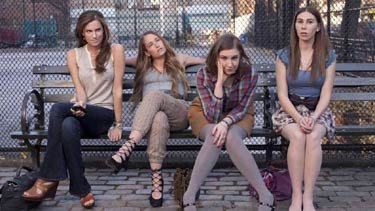Peter Augustus Lawler, in Intercollegiate Review, makes a good argument for the initially counter-intuitive thesis that HBO’s “Girls” (television series) really ought to be seen as a trenchantly bleak and realistic morality play, devastatingly critiquing the lives and philosophic failures of its four principal characters.
There are reasons not to watch the HBO series Girls. For one, we see way too much of Hannah (Lena Dunham) way too often. Ms. Dunham, the show’s creator, doesn’t know that when it comes to nudity, less is more. But Hannah’s promiscuous nudity is not pornography. That, as Flannery O’Connor explained, requires the idealized, sentimental detachment of sex from its hard relational purposes linked with birth and death.
Yes, Hannah’s body is “unsculpted.†For more reasons than that, her nudity plays as pathetic, as the sign of a wounded soul. It embodies her detachment from the forms that shape a decent life. There’s nothing safe—and nothing idealized—about Hannah’s sexual life. The main reason she’s so “inappropriate†with her body is that she’s very confused about what it is for.
We could also wax indignant about the show’s vulgar language and disgusting incidents. Maybe Girls goes too far, but for diagnostic purposes good art can exaggerate what’s revolting. And everything that is genuinely revolting here is portrayed that way. We see time and again, for example, that there’s little more degrading than casual sex in the absence of love. When we’re shown an abortion clinic, or women contracting STDs, or a string of pathetic hookups, and whiny, brittle, pretend marriages, we see the stupidity and misery of an abysmally clueless life. The show’s bitter, intended irony is this: while these girls are so proudly pro-choice, they lack what it takes to choose well.
What’s wrong with these Girls (and their boys) is that they lack character. Their easygoing world of privilege has saved them from any experiences that might build it. Their affluent parents are hardly “role models,†and they’re too flaccid to give their kids the “tough love†they need. Aristotle was right: your skill at soundly using your moral freedom depends a lot on how you were raised.
We also see plenty of evidence that what these girls really want is meaningful work and personal love. But they have not the first clue on how to get them.
Their education has failed them—another piece of realism. Hannah majored in film studies at a school in Ohio that we know is really Oberlin (Dunham is an Obie). Her major was neither “liberal†nor “vocational.†She learned nothing that would help make a living, but she did glean enough vanity to make her unfit for the “entry-level†jobs for which she barely qualifies. She also fancies that she can earn a living as a writer. While her prose style is pleasing, she has nothing “real†to write about. She didn’t read with passionate care any “real†books in college. Her education taught nothing “real†about her responsibilities as a free and relational being.
So here’s another solid takeaway from the show: few students whose majors end in “studies†have the education, talent, or discipline to succeed. In lieu of marketable skills and a work ethic, they boast a rich sense of entitlement. They spend lots of time, quite shamelessly, figuring out how to thrive as parasites. Their extended undergraduate adolescence prepared them only to scheme to stretch dependency out ever further. The girls aren’t becoming women. They do know they’re supposed to grow up, to change in a maturely relational direction. But they lack most of the resources—beyond mixed-up longings—to figure out how.
Read the whole thing.






Please Leave a Comment!